S.T. Sanchez's Blog, page 19
September 12, 2018
Interview with David Hillman author of Berkley A nose tale
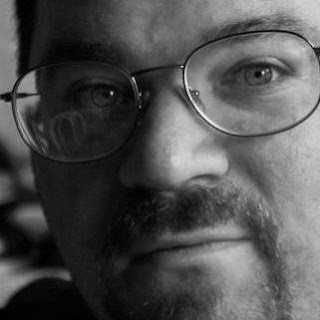
Today I'd like to welcome a talented illustrator and author, David Hillman. Tell us a little about yourself.
I’ve been a freelance illustrator for over 20 years, illustrating everything from comic books, storyboards, and toys and games. My book, “Berkley, A Nose Tale”, coming out on November 1st this year, will be my debut children’s book.Congratulations! There is nothing like publishing your first book. What brought about the idea for this book?
The image of Berkley had been in my head for a number of years. To me there was something appealing about a dog with a huge nose who uses it to his advantage. It was only in the last two years that I started to build a story around the character.
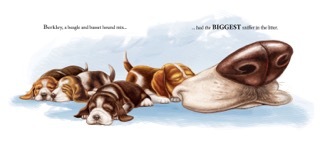
Where do you see yourself in five years?
Continuing to write and illustrate the further adventures of Berkley, as well as the other characters I have running around in my head.That's exciting. I love series, because the story goes on and you get to learn more about the character you love. David, have you been given any helpful advice? If so What?
I’ve been fortunate enough to have a lot of wonderful people in my corner, and the best advice I’ve gotten so far is to take time to find my voice. Create the way you feel is right and an audience will find you.Currently, what are you working on?
Right now I’m roughing out the next adventures of Berkley.Tell us a little bit about your main characters:
Berkley is a Basset hound/Beagle mix with the biggest nose you’ve ever seen! And he’s always sticking it where it doesn’t belong, often getting himself into trouble, but ultimately he learns how to use it to his advantage to help others.

What was your favorite scene to write?
Anytime Berkley’s nose gets him in trouble.Who designed the artwork for your cover? Or did you design it yourself?
As an illustrator I designed all the artwork myself, but my publisher’s design team did all the typesetting.I think it looks fantastic! Is there something you learned from writing your first book?
Creating a children’s book is not as easy as one might think, especially if you are both writing and illustrating it.How many times do you think you read your book before going to print?
I’ve gone through my book countless times, right up to the very moment of the last approval stage.

David, any last words?
Writing and illustrating picture books has been a dream of mine for some time, and sometime I regret that I didn’t start sooner. However I’ve slowly come to realize that finally following my dream here and now is where I’m supposed to be. And I’m Ok with that.
That's great! Be sure to check out Berkley and his many adventures.
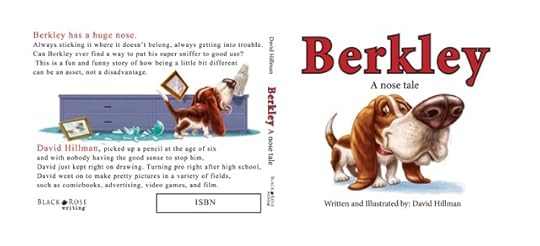 Available for Pre Order Today!
Available for Pre Order Today!http://www.blackrosewriting.com/childrens-booksya/berkleyanosetale
WebsiteFacebook
Publisher
Happy Reading!!
Published on September 12, 2018 09:49
September 10, 2018
Interview with Shari Sakurai author of Demon's Blood
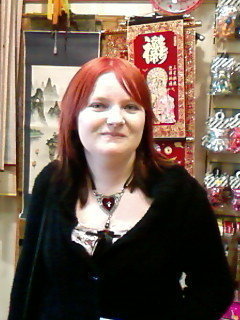
Today I'd like to offer a warm welcome to author Shari Sakurai. Tell us a little about yourself.
My name is Shari Sakurai and I am a British author of paranormal, horror, science fiction and fantasy novels that almost always feature a LGBT protagonist and/or antagonist.
When I’m not writing I enjoy reading, going to the cinema, listening to music and spending time with my friends and family. I’m fascinated by other cultures, in particular Japanese culture, which has also influenced my work.
I understand your fascination with other cultures. There is so much beauty in other parts of the world. What brought about the idea for this book?
I’ve always been obsessed with all things paranormal, especially vampires. I have so many books exploring the origins and myths in various cultures, but noticed that whilst Japan have some monsters with vampire-like traits there aren’t any actual vampire stories originating from Japan. So it got me thinking about my own origin stories for Japanese vampires and Demon’s Blood came about mainly because of this.
I understand your obsession with Vampires. Where do you see yourself in five years?
I plan to keep writing. I have so many ideas for novels that I’m excited to share and hopefully will have more time to do this over the next few years.
Shari, currently, what are you working on?
I’m currently working on my sequel to Demon’s Blood. This will pick up where Demon’s Blood left off and will further explore the origin story in the first novel as well as focus on Thane’s search for Taku’s sire; the only vampire with the knowledge to save him.
What has been the most difficult thing you have struggled with since you began a career in writing?
Finding time to write is the most difficult thing for me. I have quite a demanding full-time job so I really struggle to find the time to do much in the week. I try to get at least a paragraph written each night but weekends are mainly my only time to do a lot of writing.
Consistency is the key, even if it's only in small bits. I hope to one day be able to write full time. Tell us a little bit about your main characters
The main two characters in Demon’s Blood are vampires Taku Kokawa and Thane Bremen. Taku and Thane are lovers, and Taku is also Thane’s sire.
Taku seems over-confident, short-tempered, arrogant and detached. These traits are ones that are seen primarily by those who do not know him well or who cross him. Taku has little compassion for humans and makes no secret of his loathing for other vampires. He feels that most humans are not worth his time and he is wary of his own kind. This natural isolation makes it difficult for anyone to get to know the real Taku and he is generally guarded when it comes to forming relationships. Hidden by the confidence there are insecurities, fears and doubts that Taku is afraid of even acknowledging as he believes that doing so would be a form of weakness. Despite not being able to show it as often as he perhaps should, Taku loves Thane very much and everything he does is ultimately motivated by his desire to keep Thane safe.
Thane is the opposite of Taku personality-wise. He’s compassionate and has a lot of empathy for their victims. Thane hates killing and only does so out of necessity. He’s not afraid of his emotions and often gets upset at Taku’s inability to understand them. Thane tries his best to remain similar to the person that he was before he was turned into a vampire and dislikes using his supernatural abilities. Thane can be quite naïve and prefers to see the good in others rather than the bad. Thane’s kind nature is a rarity, if not unique in their kind, and Taku, against perhaps his own best judgement, tries to shield Thane from the darker sides to their existence as much as possible.
What was your favorite scene to write?
The scene in Silver Park just before Taku and Thane are attacked by a vampire hunter. Thane’s concern for Taku and Taku’s response makes him realise for the first time that something is terribly wrong with his lover.
What kind of research do you do before you start a new story?
For Demon’s Blood I did a lot of historical research into the Edo period in Japan’s history and also brushed up on my knowledge of Victorian times in England. I also researched monsters similar to vampires in Japanese mythology.
. Shari, how do you handle criticism when it comes to your writing?
Constructive criticism rarely bothers me. I find it helpful in a review for a reader to tell me if there was anything that didn’t work for them or they found confusing so I can take their comments into consideration when working on future novels.
Which do you find more challenging inventing the hero or the villain? Why?
I’d say the hero. With a hero there are certain lines that you cannot cross, whereas with a villain they can go as far as their character will let them.
How many times do you think you read your book before going to print?
I read it at least ten times. I’m a complete perfectionist and I probably read it too many times if I’m honest, but ten times is the minimum that I allow myself before hitting print!
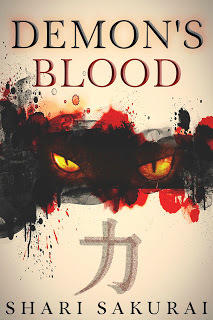
Thanks for sharing with us today. Happy Reading!!
Websites: http://www.sharisakurai.com and http://www.perfectworldseries.com
TwitterFacebookAmazonGoodreads
Published on September 10, 2018 17:19
September 7, 2018
Interview with Karen Eisenbrey author of Daughter of Magic
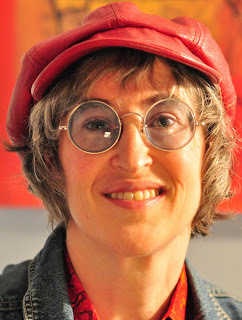
Welcome Karen, tell us a little about yourself.
I live in Seattle, WA, where I lead a quiet, orderly life and invent stories to make up for it. Without my hat, I am invisible. I have been writing for 20 years (but meaning to write for 40) and was first published in 2013. I also sing in a church choir, play drums in a garage band, and surprised myself by writing songs for my debut YA novel The Gospel According to St. Rage. My newest book is a YA wizard fantasy, Daughter of Magic, released by Not a Pipe Publishing in 2018. I share my life with my husband, two young adult sons, and two mature adult cats.
Congratulations on your new release. Karen will you share a short excerpt from your novel?
Luskell walked at twilight on a country road she didn’t know. She wasn’t lost; she was on her way to Deep River. It was the town that was lost, and she had to find it. She could make out silhouettes of scattered trees in the distance, but no lighted windows or darkened houses. Yet she knew she was near, the way she knew things in dreams. Oh. A dream. Of course. She kept walking. But not alone. Luskell sensed a presence at her side, keeping pace with her. She didn’t dare look but stopped in the road and whispered, “Who are you?” “Don’t you know me, Luskell?” Her fear fled, and she turned to face her companion. He was a tall young man, rail thin, with Mamam’s pale skin. It should have been too dim to see clearly, but a light from somewhere else showed his hair to be as red as Mamam’s, too. “Ketwyn?” He grinned. “You do know me! I knew you would! I told him you would.” “But you’re a baby. You’re dead.”
What brought about the idea for this book?
This is actually the fifth book I've written in this setting, though the first four are not (yet) published. In the spring of 2000, I had a very brief dream with two wizards and at least three plot twists. From that seed grew my first novel that was worth working on, and that book became four, a big family saga in a realistic natural setting but with magic woven through. In 2009 I returned to that world with a new story about the next generation. My main character Luskell hadn't even been born yet in those earlier books but wouldn't have existed without them. I imagined a young teenager who had grown up with magic but had concluded prematurely that she had no power herself. What if that latent, unacknowledged power allowed the dead to speak to her her in dreams? And what would happen if her power manifested when she was apart from her parents and had to figure things out for herself?
Karen, where do you see yourself in five years?
I'll still be writing because I can't stop now. There's a chance I'll be retired, which should give me more time to write! If all goes well, I could have 2, 3, even 4 more books out by then.
Writing can be addictive. Currently, what are you working on?
This year, I have been working on sequels to both my published novels, which are both young adult but very different from each other. I just submitted the sequel to The Gospel According to St Rage, which is comic urban fantasy about garage rock and superpowers, so I'm about to return to wizard fantasy with the second Luskell book. It's basically done but way too long, so I have a lot of cutting ahead of me. Sob!
What has been the most difficult thing you have struggled with since you began a career in writing?
I am not a natural self-promoter. I have had to push myself outside my comfort zone to pursue reviews, interviews (like this one!), speaking engagements, etc. I try to do at least one thing a week, whether it's writing to bloggers or reaching out to bookstores. I can handle that much, and I've learned to be realistic: I don't beat myself up over the things that go nowhere and I'm very thankful for anything that pans out.
Every little bit counts. Tell us a little bit about your main characters.
My main character Luskell is 14 and a half (so she thinks of herself as almost 15) and fairly cosmopolitan for her world. Her parents are both powerful magic users but Luskell hasn't developed any powers of her own yet, and assumes she never will. Luskell is charismatic and impulsive, which means she drags her friends into scrapes but also gets them back out. Her friend Jagryn is older but less experienced. He's also more level-headed but allows Luskell to draw him into trouble because he has a crush on her. Laki is older than either of them and from another culture, so he brings a different perspective and skill set when the three of them decide to learn magic on their own.
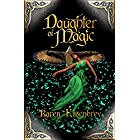
Karen, what was your favorite scene to write?There are two that spring to mind: 1) When Luskell first meets her grandfather Knot in a dream. He was a complex and difficult character who I had enjoyed writing, but he died at the end of the previous book, before Luskell was born. I loved bringing him back into the story and introducing them to each other, because they have a lot in common. 2) When Luskell transforms for the first time, because I love trying to get into the experience of a non-human animal (in this case, an owl) and to imagine flying under one's own power.
Do you have people read your drafts before you publish? How do you select beta readers?
I read chapters aloud to a small writers group. When something is finished, I have four main beta readers, including my husband and my sister, who tend to make big-picture comments and also find typos. One of the others volunteered years ago when I had finished only one or two things. She reads every book at least twice and offers detailed responses. The fourth I encountered in an online authors' community. I think I won one of her books in a drawing and loved it so much that I sought her out and we hit it off and started reading for each other. She also offers detailed and insightful comments. Although they all have individual manners of reading, I trust all of them to read intelligently. Somehow, they also manage to find different, mutually exclusive sets of typos! I carefully consider their suggestions and objections, which invariably improves the book.
Having a good team is a critical part of the writing process. Who designed the artwork for your cover? Or did you design it yourself?
We were working with an artist who had come up with a really nice character design, but the artwork was going in more of a historical romance direction, rather than fantasy, and he wasn't going to be able to make the changes we wanted and still finish in time for the planned release. So Ben Gorman, one of the co-publishers, put together a design, I suggested color changes, and that's what we went with. It wasn't what I was expecting but I think it turned out really nice and I can explain how every element fits with the story, if anyone asks. It's also unexpectedly similar to the cover of my first book, even though they are unrelated.
How do you handle criticism when it comes to your writing?
Like a grownup, which is to say I keep my pouting and arguing to myself. Then I take a deep breath and think about whether the critic is onto something. Usually they are, and I try to use that to improve the next draft or project.
Which do you find more challenging inventing the hero or the villain? Why?
Villains. The hero is usually the first to appear, almost like they self-invent. Then I have to come up with a worthy antagonist, which is difficult because I don't like to think about what kind of person would try to prevent my protagonist from doing their thing. And they have to have a believable motivation for doing that! I know I'm onto a good one when they're too much fun to write even though they're an awful person. More often than not, they're more misguided than evil, though I think the real villain of Daughter of Magic is unredeemable.
How many times do you think you read your book before going to print?
This is a book I'd been picking up and putting down over nine years, so probably at least 15 or 20, but I didn't keep count.
It's amazing how much time it takes to get a book ready for publication. Karen, do you have any last words?
I am not ambitious or aggressive about pursuing goals, but I've learned to be ready when opportunity climbs into my lap and starts to purr.

Daughter of Magic on Amazon The Gospel According to St Rage on Amazon WebsiteFacebookTwitter: @KarenEisenbreyGoodreads
Thanks for sharing with us. Happy Reading!!
Published on September 07, 2018 00:30
September 3, 2018
Interview with James Foard author of The Kindred Chronicles

Tell us a little about yourself:
My name is James Foard. I have just released my debut novel – The Kindred Chronicles: Origins Unknown. I live on the South Coast of the U.K with my wife, two sons and two high spirited dogs. I have had a love for all things Sci-fi and Fantasy for as long as I can remember. This was nurtured with the release of Star Wars, Indiana Jones, Alien, et al, and later, The Lord of the Rings and Harry Potter.
Books that were never too far away from me in my early years were The Chronicles of Narnia and most things by Roald Dahl – Charlie and the Chocolate Factory and George's Marvellous Medicine being particular favourites. But the one book that had the biggest impact on me was The Lord of the Rings.
Escapism was a key part of my early life and continues to be. Growing up on a farm in some ways was quite a solitary existence but it did give me the opportunity to explore and allow my imagination to thrive.
With an innate ability to tell a story, I used to make up tales on the spot for my younger brother and sister when they couldn’t sleep at night.
None of my friends or family will challenge me at Scrabble or indulge me with a game of Lord of the Rings Trivial Pursuit – I’m not sure why.
I might take you up on the Lord of the Rings Game. My kids think I'm a little obsessed with it. Will you share a short excerpt from your novel?
Magissa Veil was a tall, thin woman with jet black hair that was pulled back so tight that it seemed to be pulling her facial features higher up her face than they should be. She had a very pale, gaunt complexion that only served to accentuate her cold, green eyes. They say a person’s eyes are the windows to their soul, well if that was the case, Magissa Veil did not possess one. Everything about her was emotionless – rigid. The way she spoke, the way she looked and even the way she moved. “Clean that up, you fool!” she hissed. The disdain in her voice was evident.
“What information do you have for me?”
Varios Veil finished cleaning up his mess and then apologised once more.
“I’m sorry, Mother.”
“Yes, yes, yes, just tell me what you know and then be on your way.”
“I was on the edge of the Ensing Forest, near the Cragon Hills this afternoon and I saw that crackpot Mystic, Maven.”
“Maven! He is of no concern to us; he hides away in the forest. He lost his mind right about the same time as his king.” She looked towards another room as she said this and her lips curled slightly at the edges and formed the most sinister of smiles. “This isn’t news. If there is nothing more, then be on your way.”
She started to walk away.
“He wasn’t alone,” said Varios.
Magissa stopped in her tracks and her smile faded away.
“What do you mean he wasn’t alone?”
What brought about the idea for this book?
I came up with the basic concept of the book and the story and characters evolved from there. I drew on experiences from my own childhood for the main character, but in saying that, he is not me and I am not him.
James, where do you see yourself in five years?
I see myself having multiple books/series under my belt and will hopefully have enjoyed enough success to become a full time author. I have a deep and genuine love of writing that I can only see growing over the years. I find it extremely therapeutic and it is something that I feel so suited to.
I understand the draw. Currently, what are you working on?
I am currently working on book two of The Kindred Chronicles. This is the second book in a planned trilogy.
What has been the most difficult thing you have struggled with since you began a career in writing?
I, like just about any other writer in history have had periods where the creativity just won’t flow. But my biggest struggle is the marketing and promotion of the book. In terms of both ideas and the time to implement them (I currently have a full time job).
Marketing is never the fun part. I think it's something most writers struggle with. We'd all rather spend our time writing. What was your favorite scene to write?
There is a scene where the group are pinned down by a Hydra. Without giving too much away, the stakes are raised significantly at this point in the story. This particular scene flowed more than any other in the book. Where this book is concerned, I have had the good fortune of being able to envisage what I was writing almost as if it were a movie playing out in my head.
What has been the best compliment you have received?
I have had a lot of positivity from various people and I appreciate every one of them. The best compliment that I have received though is a review from a fellow author. They had no vested interest at all and to receive such a great review from a peer, made me feel as though I can really achieve as an author.
How do you handle criticism when it comes to your writing?
I welcome constructive criticism as no matter what, none us are infallible and can always learn and improve in anything that we undertake. What I do not like is criticism for criticisms sake. But in saying that, no one could be a bigger critic of my work than me. So ultimately, if I am happy with the end product then it bodes well.
James, is there something you learned from writing your first book?
The most important thing that I learned is to write what you love. If you write something that you love, the reader will pick up on this and it will resonate with them. Whereas if you try to write something that just isn’t you, it will just not translate properly or feel right.
I agree. Which do you find more challenging inventing the hero or the villain? Why?
Personally, I find it harder to invent the hero. The reason for this is, the hero will go through challenges, trials and tribulations that will test your ability to keep them ‘heroic’ and not send them down a bad road or turn them into an anti-hero. The villain however will start off bad and through their actions, will generally become all the more evil.
How many times do you think you read your book before going to print?
I read it start to finish probably around a dozen times. I lost count of how many times I read it from the beginning to whatever point I had gotten to during the course of its creation.
James, any last words that you'd like to share?
Just to say thank you very much for taking the time to post my interview, it is greatly appreciated.
James, thank you so much for sharing with us today. Happy Reading!!

WebsiteOrigins UnknownAmazon US LinkGoodreadsTwitterFacebookInstagram
Published on September 03, 2018 06:36
August 31, 2018
Interview with Jennifer Rayes Author of Intricate Deceptions
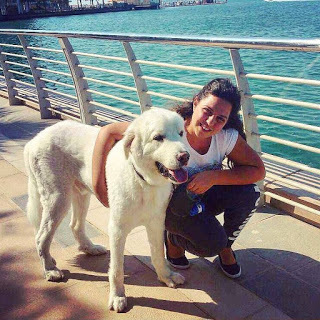
Let's welcome Jennifer Rayes today! Jennifer will you tell us a little about yourself? My name is Jennifer Rayes. I have written a fictional new adult series, Intricate Series, based on experiences from my life and other people I know. I am originally from Lebanon and grew up between there and the US. I studied Chemical Engineering in Ohio, and now work in the UAE with my Great Pyrenees, Koby.
What a beautiful dog. What brought about the idea for this book?
I have always enjoyed writing, and began doing so at an early age. A few years ago, I was watching a series on television with family, and thought to myself I can write something like this. That same night, I started working on Intricate Deceptions, and those first few pages turned into a chapter, then that chapter turned into a book. It’s something I enjoy doing, and my inspiration comes as I write.
Where do you see yourself in five years?
I’d like to be writing and see my series turned into a movie or a show.
Best of Luck. You never know what could happen. It seems like all of the great movies and shows stem from a book. Have you been given any helpful advice? If so What?
To become a writer, you just have to write. I find writing to be like exercise; the more you do it, the easier it gets, the longer you stop, the harder it is to get back into. If going through a block, I recommend reading.
Jennifer, currently, what are you working on?
Book 3 in the Intricate Series.
What has been the most difficult thing you have struggled with since you began a career in writing?
My best writing comes out in the middle of the night between 2 and 5 am. Unfortunately, it’s a very difficult time to write, as I’m usually asleep.
I understand, many a times have I been comfy in my bed when inspiration strikes. Tell us a little bit about your main charactersMy main character is a girl that is a victim of kidnap and human trafficking, who then, through several twists, comes into power and decides to fight these organizations and corruption.
What has been the best compliment you have received?
That a reader couldn’t put the book down.
How do you handle criticism when it comes to your writing?
At first, it used to sting a lot. Now, I am able to step back and take the positive from whatever feedback I get, and use the negative to improve.
Is there something you learned from writing your first book?
It’s a journey, a long journey.
It is and a lot of work but if you persevere you can get through it. How many times do you think you read your book before going to print?I’ve lost count.
Jennifer, thanks for stopping by and sharing with us today. HAPPY READING!!
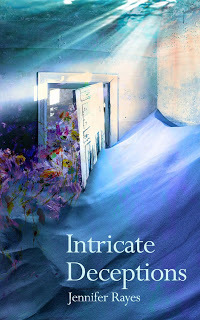
Amazon Link Goodreads Facebook Instagram
Goodreads Author Page Amazon Author Page
Published on August 31, 2018 06:17
August 27, 2018
Interview with Robbin Miller author of Breaking Barriers: A Girl’s Dream to Play Little League with the Boys
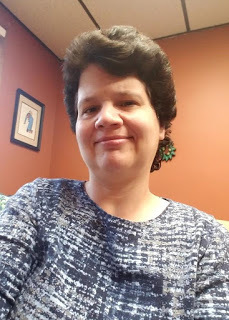
Today I would like to welcome author Robbin Miller. Tell us a little about yourself.
My name is Robbin Miller. I am a Children’s Book author since 2015. My current book titled, “Breaking Barriers: A Girl’s Dream to Play Little League with the Boys” is my first chapter book for children ages 8-11 years. It is a memoir of my experiences playing little league baseball in 1975 after it became legal in 1974.
I am a licensed mental health counselor in private practice and an adjunct faculty and success coach at a community college. I have my own TV show titled, “Miller Chat” which is cable-casted on Channel 28 in Shrewsbury, MA. I produced over 300 shows on different topics pertaining to families and to persons with disabilities. I am a mother of a 9 year- old boy and married for 27 years.
Robbin, will you share an excerpt from your book with us.
My name is Robbin Miller and this is my story. I played baseball with boys from 1975 to 1977; however, it was not always possible to do. That’s because girls were not allowed to play Little League Baseball until late 1974. It took several court cases and a US President to sign a new law before girls were allowed to enjoy playing the game alongside boys.
Prior to the signing of the law, girls and women either played in their own leagues or in the minor leagues with men. Sometimes the women’s baseball careers were cut short due to society’s expectations of what a woman was supposed to do in those days.
I consider myself a pioneer because I rose to the challenge of becoming only one of four girls playing Little League baseball in Bayside, Queens, New York with boys. I learned that being calm and collected built up the self-confidence I needed to face the verbal abuse I received from the crowd and from fellow boy players in Little League. I also learned how outside influences such as struggling in school and trouble with friends resulted in poor performance, causing a setback in my baseball career. However, working hard for the comeback is the sweetest accomplishment. It’s a valuable lesson for any young person to learn during their formative years.
When I tell my story to others, their facial expressions reflect utter disbelief at the meanness directed at me when I was trying to play Little League baseball with boys. It was not just the kids; adults played their part in trying to discourage me from my goal.
What brought about the idea for this book?
I wanted to inspire girls to play little league baseball. I find through the literature that not many girls play little league baseball as they are encouraged to play softball instead. For girls who do play little league baseball, they are discouraged from playing baseball with boys after they turn 12 year-olds and are directed to play softball with girls.
I wanted to share my story when I played in 1975 as a pioneer who took on the challenge to overcome the adversity and resistance I endured from the boys and from the fans. A law was passed in December 1974 and signed by a US President that allowed girls to play little league baseball. I thought my entrance in an unknown domain would be easy and accepting. Apparently, I was wrong and learned some powerful lessons to achieve my dream.
I bet that was quite an adventure being one of the pioneers. Where do you see yourself in five years?
I want to write more chapter books/picture books on issues important to children. I love writing stories that I have either observed or experienced in my life. I enjoy promoting important growth and transformational lessons for children to learn from and to continue in their lives. I would like to teach full-time at a college and retire from mental health counseling. Best of Luck to you, I hope you find the time to write more. Have you been given any helpful advice? If so What?
I have learned to follow your passion and do what you love in life. Don’t look back and regret, instead, move forward with grit and self-determination to accomplish your goals and dreams in life.
Currently, what are you working on?
I am not working on anything currently. However, I am seriously thinking of writing a sequel to my chapter book that tells the story of my academic struggles in school and how little league baseball helped me get through it.
Robbin, what has been the most difficult thing you have struggled with since you began a career in writing?
I work two part-time jobs and volunteer in my community and in my son’s school on the PTO. Writing is more a hobby for me and not a full-time job. I wish it was the other way around but I need to be realistic in setting my priorities and paying the bills. However, I do make the time to write pieces of my work a few days a week as I find writing to be very therapeutic for me.
I think that's a struggle a lot of authors have, just trying to find the right balance. Tell us a little bit about your main characters:
The main character is me as a 9-year old girl learning wanting to play little league baseball without knowing that it was illegal for girls to do so in 1974. Fortunately, the law was passed that enabled the main character to play with boys; however, she was naïve in believing it would be smooth sailing for her. She entered unchartered territory that resulted in a tailspin of enduring verbal abuse and bullying but with the determination and grit to prove she can play as well as the boys in the baseball diamond. The main character learned some important lessons that became life-long for her.
What was your favorite scene to write?
The favorite scene was writing about the parade and how myself and three other girls received loud boos, jeers and name-calling from 300 boys and fans on the baseball diamond.
That must have been hard to live through as a young girl. What has been the best compliment you have received?
“Thank you for sharing your story and inspiring girls to play little league baseball with boys.”
What kind of research do you do before you start a new story?
I look on the web for information from reliable sources to see if my kind of book has been written before and historical research if I am writing a memoir, non-historical non-fiction- of my past experiences in a particular life -changing event.
How do you promote your books? Any tips you can share?
I use social media such as Facebook to join author and parent groups interested in my books.I also advertise on children’s books websites. My publisher has a marketing director who is responsible for writing my press releases on my book and emailing them to appropriate prospects.
Robbin, do you have people read your drafts before you publish?
Yes, I have hired professional editors to read my rough drafts before emailing to prospective publishers and/or self-publishing them by myself.
How do you handle criticism when it comes to your writing?
I take it in stride. I have come a long way to improve my writing skills since I was a child. I appreciate the feedback and take steps to polish up my writing.
Is there something you learned from writing your first book?
My first picture book was “Playgroup Time,” in which I self-published it on my own. I learned about the challenges in marketing your book to prospective customers and to book stores as many of them prefer a traditional publisher and/or agent to pitch your books to them to sell for you.
Unfortunately that is a struggle I think most Indie Authors have to face. Which do you find more challenging inventing the hero or the villain? Why?
I find it more challenging to invent the hero as I have to make sure the character follows the direction and transformation on the “Hero’s Journey” path.
How many times do you think you read your book before going to print?
Enough times to know before it goes to print.
Robbin, any last words that you'd like to share with us today?
Write what you love and share your story.
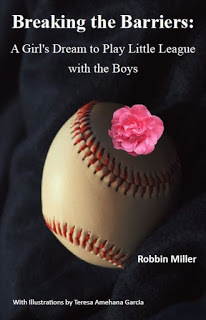
Thanks for sharing with us. Happy Reading!!.Playgroup TimeAmazonThree Best FriendsAmazonBreaking Barriers: A Girl’s Dream to Play Little League Baseball with Boys.AmazonFacebook
Published on August 27, 2018 00:00
August 24, 2018
Interview with Scott Kinkade author of the Divine Protector Series

Today I would like to welcome Scott Kinkade. Scott, can you tell us a little about yourself?
My name is Scott Kinkade. I’ve written nine novels and a few short stories. My books usually fall into either science fiction or fantasy categories, but I occasionally veer off into non-genre stories. I have two series’ thus far, my steampunk Infini Calendar series, and my urban fantasy Divine Protector series. Everything else I’ve written stands alone.
Sounds like you've been busy. Will you share a short excerpt from one of your novels?
As he walked back to the hotel, he mentally went over his itinerary for the next day. Attending the New Birth bash wasn’t the official reason he had come to Seraphim City. In truth, he had come here to visit Seraphim City University. He had recently graduated from high school, and now he needed to find a college. He was considering a law degree. He wanted to uphold justice throughout Morovia, and he felt that was the best way to do it. He would defend the innocent and punish the guilty. While he thought about this, he suddenly realized he was alone on a dark street. That made him nervous; Seraphim City, for all its splendor, had a high crime rate. He feared he might become its next victim. He passed an alley. Without warning, a raspy voice whispered, “Ev Bannen.” Ev stopped, frozen. Had someone in the alley just called his name? “Is someone there?” he said weakly. For a moment there was dead silence. Then, “Ev Bannen.” “W-What do you want?” “Come...closer.” He couldn’t explain why, but he felt compelled to obey the voice. He walked into the alley. Only a dim bulb above a backdoor provided any illumination. He was terrified but found himself unable to stop. When he finally stopped deep into the alley, he detected faint movement in front of him. It looked like a dark swarm of things. He stood transfixed. Every instinct he had told him to run like a maniac, yet he couldn’t get his legs to obey him. The swarm soon coalesced into a vaguely human shape. “Vaguely” was definitely the applicable term; the proportions were all wrong. It had huge bulbous arms, toothpick-thin legs and disk-shaped head. Ev couldn’t make out any more than that because of the lack of light, but he didn’t want to. It reached out and stroked his face with its oversize hand—or maybe it was a claw. Ev wanted to cry out in terror, even though that wouldn’t have been very manly.
“Yes,” it wheezed. This is it, he thought. I’m going to die here, before I even have a chance to do anything with my life. However, from somewhere above him, a radiant orange glow appeared. The…thing…jumped back, raising a massive hand in front of its face. It was then that Ev got a better look at it. The whole creature was black as midnight, and its skin—assuming that was skin—looked oily, like a snake. But the worst part was the face; it had none. It might as well have been a black hole. Ev thought the scene couldn’t get any more surreal. He was wrong. Another figure came out of the air and landed in front of him. It was a man dressed like a college professor, with a dark suit and short cropped hair of a muddy hue. “Not fair,” the creature hissed. Ev had no idea how the thing was talking with no mouth. The man raised a fist. No, not just a fist—a flaming fist. He swiftly rammed it into the thing’s chest. It let out an earsplitting howl before emitting an orange glow and turning to ash. Before tonight, Ev had no idea how much he had taken reality for granted. He realized, now, that it was a precious anchor, keeping you in the world you know, a predictable world full of rules, rules that all living things had to abide by. But this world he now found himself in, it had no rules. Anything could happen, and that was the truly terrifying thing about it. The man turned around to face Ev. He looked to be in his forties, with hard features lining his face. Yet there was also compassion there. “Are you all right?”
All right? No, Ev was far from all right. He had been shaken to his core, and he honestly didn’t know how his bodily fluids had stayed inside him this whole time. In truth, he had experienced the terror of realizing he didn’t know anything about the world he lived in. The man gave him a cursory examination. “Good; it didn’t hurt you. If it did, you’d damn sure know it.” Finally, Ev managed to form a sentence. “What…what the hell was that?” He stared at the smoking remains. The man eyed it with disgust. “A refghast. Low-level monsters. They feed on humans.” Ev shook his head in disbelief. “I didn’t want to come in here, but I did anyway.” “The refghasts emit a hypnotic signal that compels people to obey them,” he explained. “But you didn’t obey. You…punched it with a flaming fist!” He grinned. “One of the perks of being a god.” Ev blinked. He could not possibly have heard that right.
“A…god,” he said in disbelief. “Yes, Ev. I’m a god.” He shook his head vigorously. “No way. That can’t be true. Wait—how do you know my name?” The man said, “We’ve been watching you, Ev. We think you have what it takes to become a god yourself.”
What brought about the idea for this book?
I assume you mean God School? The idea came about around 2011-2012. I was still working on my Infini Calendar trilogy. I don’t remember exactly what happened, but I got this idea for a series that would be sort of like Harry Potter, but on a more bombastic level. Instead of going to school to become wizards, the characters would go to school to become gods. I also decided early on that one of the students would be a traitor. In addition, I had this image of a race of giants that would menace the protagonists. This ended up becoming the Nephilim. They were originally supposed to invade the school, but I realized they’d never be able to fit in there! So I had to switch gears and make them attack outdoors.
Where do you see yourself in five years?
Being a consultant on the movie version, if there’s any justice in the world. And making a lot of money.
Well best of luck to you! Make sure the movie sticks to the books, I hate it when Hollywood changes things. Scott, have you been given any helpful advice over the years? If so What?
“Show, don’t tell.” Also, avoid info-dumping. Don’t put a ton of information all in one place; space it out.
Currently, what are you working on?
I’m currently working on Return of the Nine, the sixth—and perhaps final—entry in my Divine Protector series.
Sometimes it's hard knowing where to end. Just remember you can always do a continuation series if you find that there is more to write. Brandon Mull did it with Fablehaven and I am loving his new series. As an author what has been the most difficult thing you have struggled with since you began a career in writing?
Getting past bad reviews. A lot of people are going to tell you your writing is god-awful. And the more people that tell you that, the more you start to believe it. If you get more bad reviews than good ones, it can be overwhelming. On more than one occasion, I’ve questioned whether I’m a good writer. I even considered quitting. But the important thing is to believe in yourself but also be open to bettering yourself.
Tell us a little bit about your main characters
Ev Bannen was just a normal guy looking to have a normal life. But that all changed when he was accepted into Divine Protector Academy. Now he’s on track to becoming a god and taking on the responsibility that comes with that. However, he may always be burdened by the knowledge he’s killed people. Part of him thinks of himself as a monster for the lives he’s taken. Fortunately, he has Maya to believe in him. She has her own dark past, so she doesn’t judge him. She understands that people can be redeemed, even if she’s slow to trust others.
Scott, what was your favorite scene to write?
There are so many scenes I enjoyed writing. My favorite scenes are the ones where characters display their vulnerabilities: Maya reminiscing about her tragic childhood, Serika breaking down upon remembering her own death, etc.
What has been the best compliment you have received?
I’ll share with you the review on my short story “Hell is Everyone but You.”: Hell is Everyone But You by Scott Kinkade is a short story that was touching on many levels. It tells of a chance meeting in a holiday resort of two people that just want to escape reality. Fiction writers would say that it's harder to write a short story than a long novel. The challenge is not to rush things or introduce characters that are not fleshed out. This is a challenge that I feel Scott handled really well. This story encourages as well as offers hope for us all. One other thing I took from this story was the sensory sensitivity that people with Asperger's feel.
It's great to have a really good review like this one to go back and read when the negative ones get you down. What kind of research do you do before you start a new story?
It really depends on the setting. I had to do a lot of research for my novel The Game Called Revolution because it takes place in revolutionary France, I had to research things like Joan of Arc, the Women’s March on Versailles, the storming of the Bastille, the siege of Compiegne, etc. For my most recent novel, Aragami, I had to do a lot of research into the Shinto religion and its customs. For my novels that take place in a fictional universe, though, I usually don’t have to do much research because I decide what’s what in that world.
How do you promote your books? Any tips you can share?Okay, so, if you’re writing a series, make the first book free outside of Kindle (say, on Nook). Then, put it on Kindle and ask Amazon to price match it. It’s not guaranteed to work, but the chances are good. Once your book is free, market the crap out of it. You’ll gain a lot more exposure than you’d have otherwise. And if people like the first book, they’ll shell out the cash for the rest.
Those are great tips. Scott, do you have people read your drafts before you publish? How do you select beta readers?Who designed the artwork for your cover? Or did you design it yourself?I’m part of a writer’s group, and we all critique each other’s work. They’ve been invaluable for my own writing. I also have an editor named Cathy Lopez ( cvlopezediting@gmail.com ). For my covers I use Ramon MacAirap (monmacairap@gmail.com).

Thanks so much for sharing with us Scott. Be sure to check out more of Scott's works at the links below. Happy Reading!!
AmazonBarnes & NobleFacebook
Published on August 24, 2018 00:00
August 17, 2018
Book Review- Aftershock by Katherine Armstrong Walters
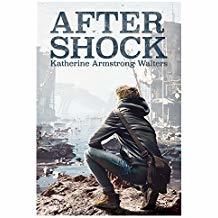
Aftershock by Katherine Armstrong Walters is Book 2 in the Arydian Chronicles.
WARNING MAY CONTAIN SPOILERS
At the end of book 1 Aqua, we are left with the California coastline in ruins due to an underwater earthquake and tsunami.
Marin and the Arydians have had to abandon their secret underwater home and are now on the run from Mr. Haan and Leviathan, the secret organization bent on taking control of the World.
Jayson is torn between staying with Marin the girl he loves and going home to search for his mother. He ultimately chooses to leave, unsure if he will ever be able to find Marin again. Before leaving he steals something from the Arydians that may lead to the destruction of Marin and all her people.
Mr. Haan is obsessed with his search for Marin and will destroy anyone who gets in his way. He has also been hard at work and created a weapon that could destroy the world as Marin knows it.
Walters did a fantastic job. Often times the second book in a trilogy can be slow, drawn out and a bit disappointing. But Aftershock is full of surprises. The momentum builds with each chapter. I thoroughly enjoy book 2 and couldn't put it down. I can't wait to see how Katherine wraps it all up in the final novel. My only complaint is that now I have to wait for book 3!
Happy Reading!!
Published on August 17, 2018 03:00
August 13, 2018
Interview with Hazel Spire author of Catching the Trade Winds
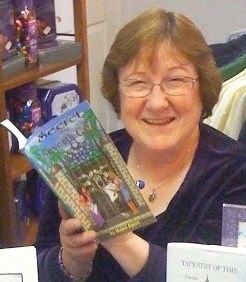
Today I'd like to welcome author Hazel Spire. Tell us a little about yourself .Both my parents were writers. Their friends met in our home in England to read their stories, which sounded fun to me. I wanted to teach, too – which I did for almost thirty years. My first middle-grade mystery, SECRET OF THE SEVENTH GATE, is set in Iran during the Shah’s reign, based on my year there at an American school. It was also where I met my GI husband. After many moves, we have retired to rural Kansas.My second novel, ARROWHEAD’S LOST HOARD is about kids finding Roman treasure on a fictional British island. My poetry collection, CATCHING THE TRADE WINDS, and an illustrated ABC of London, X MEANS TEN ON THE FACE OF BIG BEN, should both be out by Christmas.Share a short excerpt from your poetry book THE BALLAD OF CAPTAIN JACK SCURVY Captain Jack set sail one morn, In a stiff nor’ westerly breeze, Aboard Miss Jane, the finest ship To travel the seven seas. Her crew was rough, but skillful; They could steer by sun and stars. Jack’s only fear, apart from storms, Was the lure of girls and bars. This trip might prove his bravest quest, To find the hoard of gold He’d heard about from sailors’ tales And a map he kept in the hold. They set a course for Rintanzu, The isles where the treasure lay. The first leg took a fortnight; They anchored in Jellicoe Bay. The bo’sun checked the rigging; Then he said to Captain Jack, “Let’s row ashore and quench our thirst At Ben’s Inn by the railway track.” All agreed they’d earned a hearty Meal and good night’s rest; Before Jack left Miss Jane, he slipped A scroll inside his vest. He did not care for whisky; Of women he’d had his fill, But sounds behind a velvet curtain Stirred a familiar thrill. He saw the cards, the kitty, and A welcoming nod from Ben. Jack’s heart raced as he jingled his coins And entered the gamblers’ den. He parted with gilders and ducats; He lost his shillings and pence. Instead of quitting while he could, Jack tossed in all his cents. Another loss; what next to risk? His silver watch and chain? The hidden scroll? He stalled. He heard the whistle of a train. The landlord scratched his whiskers; Then at last poor Jacky twigged: Ben ran a shady business here, And every deal was rigged. “A jolly game, lads,” Jacky said, “But more than I can afford. Whoever wins this hand will get The chance to find a hoard.” The players grabbed the map; They traced the X that marked the spot. “That’ll cover me debts!” called Jack, Escaping to his yacht.
His loyal shipmates followed, Though without their usual zest. Querying his sanity, They thought they’d lost the quest. “Rintanzu!” cried Captain Jack.
“We’re off to dig for gold.
Forget about Ben’s Inn, me boys. The real map’s in the hold.” VECTIS CHILDHOOD Mermaid-hair seaweed caught between fingers,nostrils filled with the tang of freedom,our salty lips reshaping vanilla cones, we jumpedthe waves that pounded Sandown Beachand thought that summer would never end.Locals and visitors flung open beach hut doors;their kettles whistled on Primus stoves.Mr. Earnshaw trudged through squishy sandcollecting deck-chair money while a megaphoneblared the times for launch trips across the bay.Distress signals punctuated our pleasure. Boom!Boom! Send lifeboat or chopper to rescue a tripperwho tried to beat high tide around Culver Cliff.We dabbled in rock pools by lupine-lined shores,hiked up the chalk ridge (island’s backbone) strewnwith bunny currants and golden gorse to picnicat the top, sharing the vista with ghostsof Tennyson and Keats. No mainland in sight,who knew what might loom on the hazy horizon?Submarine, schooner, battleship, even a galleon. Six weeks off school culminated in a carnival: Crepe paper streamers all down the High Street saluted grand floats to a heart-jolting drumbeat. Daddy winked at me under the shiny black peak of his Town Band cap, tootling into a horn, Oh I Do Like To Be Beside The Seaside. Up to the fairground we followed in step, enticed by hot dogs, a Ferris wheel, candy floss, fireworks— eruptions of magical color that made the crowd cry, “Ooh! Ah! Better than last year!”What brought about the idea for this book?I’d been writing poems for years, inspired by the traditional verse we’d learned school, as well as free verse and other forms, such as pantoum, haiku, and terza rima. After racking up some magazine credits and contest awards, on both sides of the Pond, I put together three chapbooks of poetry in 2003, 2006, and 2013, which I sold at open mic venues. This year, I decided to put them together in a full-length collection (paperback as well as e-book) under my imprint Raemark Press, using Author’s Voice editing/design services and CreateSpace. Congratulations, I find poetry a lot harder to write than fiction. Mine always seems to sound to juvenile. Where do you see yourself in five years?I have about ten titles up my sleeve for children’s easy readers. I’d like to see myself as a paid speaker at larger venues (although the introvert in me still screams NO) with stacks of new books and a line going around the block of people wanting me to sign them! I want to do more open mic readings too.Have you been given any helpful advice? If so What?I’ve belonged to writers’ groups everywhere I’ve lived. They’re great for giving and receiving market tips and moral support. Poet Paul Ruffin once said at a writers’ forum in Texas, “Trust the process.” I displayed that advice above my desk and try to live by it, because in every project there are moments of despair.That's good advice. Currently, what are you working on?Having purchased ten ISBNs, I’m compiling a collection of short stories – APPLE PIE ORDER, by my late father, L.R Longhurst; and a kids’ early chapter book, MADAME ARCHELON’S ART ROOM MYSTERIES, based on personal experience.What has been the most difficult thing you have struggled with since you began a career in writing?
The amount of time it took from acceptance to printed book – three years for SECRET OF THE SEVENTH GATE – and the low royalties.Yes it can be a slow going process. I think many authors would give up if they didn't enjoy it so much. What has been the best compliment you have received?“You taught me to be a not-giving-up person.” Maria, age 10, wrote this in her thank-you card when I spoke at her school’s career day in Dallas.What kind of research do you do before you start a new story?My YA novels were based on my life, but I wanted to be sure of my facts about Iran, Islam, etc. for the first one, and Roman hoards for the second. The World Wide Web still being in its infancy, I read a lot of books and consulted people with more knowledge on the subject. For my ABC about London, it’s been much easier, with so many resources at my fingertips. It helped that I was born there and go back every year. And I research the market to see how my book will fit it with – or stand out from - what’s already been done.How do you promote your books? Any tips you can share?I’ll go anywhere I can get my toe in the door: community events, local theater, conventions, gift shops, bookstores, libraries, literary festivals, and schools. I do free presentations and kids’ crafts, even providing a snack that suits the theme - as long as they’ll let me sell books. I’m planning to use Amazon and social media more in the future.
Sounds like you are doing all the right things. Who designed the artwork for your cover? With my input, Jan Gilbert Hurst of Author’s Voice designed my cover for CATCHING THE TRADE WINDS, using a stock photo from the Internet.
Any last words?I’m going to share a quote attributed to Mark Twain, although this has never been proven! It gave me my book title, and the impetus I needed to reboot my writing career:“Twenty years from now you will be more disappointed by the things that you didn’t do than by the ones you did do, so throw off the bowlines, sail away from safe harbor, catch the trade winds in your sails. Explore. Dream. Discover.”
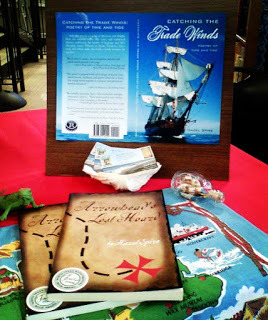 I have a site maintained by Authors Guild: www.hazelspire.comOn Facebook, I’m Hazel Longhurst Spire, but hope to set up a separate author page soon.
I have a site maintained by Authors Guild: www.hazelspire.comOn Facebook, I’m Hazel Longhurst Spire, but hope to set up a separate author page soon.HAPPY READING!!
Published on August 13, 2018 04:48
August 10, 2018
Book Feature - Enter the Superhuman Race
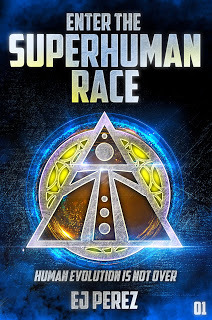
The Superhuman Race was conceived close to 3 decades ago back in 1986. It was supposed to be a comic book story. An artist was hired and panels were drafted. I procrastinated, not sure on the concept and the artist moved on. It later evolved into a book with a journalistic style, I wrote a couple of chapters this way and I loved it. But I wasn’t too sure if I wanted this format. So I stopped.At one time I considered hiring a ghostwriter to write the book, for me getting the story out was my satisfaction. I would become a story creator, writing the outline with the ghostwriter writing the book, it didn’t pan out.For a while, I put the book on the back burner. With priorities in life coming into play, I concentrated on working 2 full-time jobs for years. Exhausted, my creativity couldn’t come out, I was too tired to think. I only worked, slept and ate for years.My creative juices always in the background, they came back even with the exhaustion I felt. The cause for this; there were books being published with a hint of my story. I knew I needed to put this out before my ideas became a general thought to the rest of writers.Not satisfied with my story and where it was going, my wife suggested I put the theme of the story in the future. With my interest in all things future, it felt like a perfect fit. Thus the Superhuman Race was born into the future.I had initially 3 stories separate from each other, created way back in 1986, fusing them together only made sense. At the time, there weren’t a lot of multiple story arcs in a novel. I thought this would be different and began writing my outline. Then came GOT (Game of Thrones) and other books and I felt I was on the right track with the book as far as multiple story arcs.But now, it came for me writing the book. I am an impatient person and doing a book that would have taken a year to a couple of years to finish, was just too daunting a task and frustrating. So why not with my love of comics and soap operas and television serials, why not make the book into a novella, with cliffhangers or one-shot character stories and make them all in the same world (Universe) . In other words make a comic book format novella, numbered and set in a comic book form with prose.Writing the first book took only a month, getting it ready for publication took over 6 months. My research on getting my novella out was more in how to get it published. And which was the best route to get it published? I did not want to go the traditional route; which was finding an agent, waiting to get accepted, then more time waiting to get published (years) plus, I wanted complete control of my product idea.Which is where I am now; The Superhuman Race is the beginning of a series that will be ongoing and my hopes entertaining. I’ve enjoyed writing the characters and I hope you will enjoy reading them.Enter the Superhuman Race is the first book in a continuing Novella series set one-step into the future. It’s a quick read with about 25k-35k words, give or take, with the next book out every 2-3 months, maybe sooner.It deals with humanities struggle against a one world government with advancements in technology as the backdrop. Including humans chipped, cloned and enhanced on physical abilities through natural or artificial means. This is not a dystopia story, but a story on what happens when humanity reaches the threshold of technology in the future. Does humanity change for the better? That is the question.It’s the Superhuman Race the next evolution against the Human Race who have become oppressed in this future timeline; A very possible path that can take place if we’re not careful.
Published on August 10, 2018 05:56



